This is part 2 of an interview with Ryan Laukat about Sleeping Gods. The full interview was almost 2 hours long, so I had to edit it down to a readable length and split into two parts. If you haven’t read part 1, you should definitely start there!
Where we left off, Ryan and I were talking about Sleeping Gods unusual narrative structure, the writing process and that he wanted the world he was creating to feel dangerous and even somewhat unfair actually, all for the purpose of creating an even stronger experience.
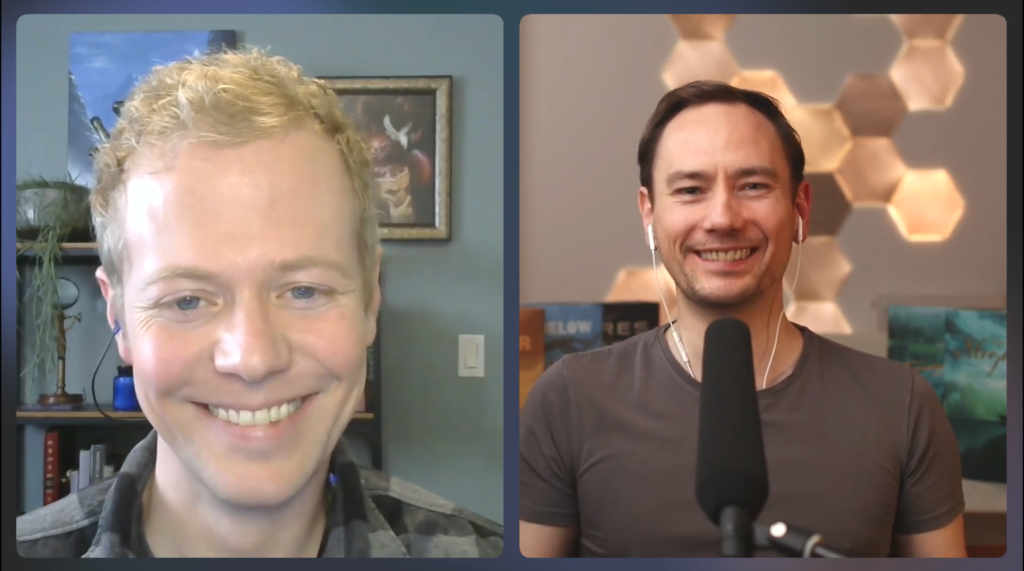
Difficulty & Failure
I was wondering how you thought about failure. I can imagine if you dial up the difficulty too much, you will lose a lot of players, and if you dial it down too much, people will say it’s too easy, there is no challenge. Did you have some aim how difficult it should be to play?
Ryan: When you start out, I wanted it to feel hard. Oh, this was the hardest thing to get right, and it still is an issue. There was a moment in the game near the end. We were like 90% done with the game and I had someone play-test the game, play-test a lot of battles, and they were just coasting through everything. Nothing was difficult and I thought, no, this is terrible! If it is too easy, no one will be engaged in the game. So I actually made every combat encounter harder, I dialled up the difficulty like 25%, maybe 30%. I dialled up the difficult 30% on every encounter.
Oh my gosh!
Ryan: And we were like 90-95% percent done with the game [Laughs]. I remember when the game came out, when it was delivered to the kickstarter backers, the comment section was constantly exploding. I mean it was so many people on there and there were people just so angry at us. So mad, that we made that game that was so unfair, so hard, just way, way too hard. And then I would get comments later that would say “oh, the game is just a breeze. The game is just way, way to easy”. Before the game came out, I was so worried getting the balance right and I feel like where we ended I’m pretty happy with. Gosh, getting it right was so hard, you know. It’s one of the hardest things designing a game like this.
Yeah, I can imagine. So is it like: if you have people on both sides of the spectrum complaining equally much, you have done your job correctly?
Ryan: [Ryan laughs] yeah, I think so. One thing I did in Sleeping Gods: Distant Skies [was] right from the beginning, I was designing with three levels of players in mind: the players that want it to be easy, the players that want it to be challenging, and the players that want it to be really challenging. And I feel like, in Distant Skies, it’s smoother for those players. It’s easier to switch between the difficulties.
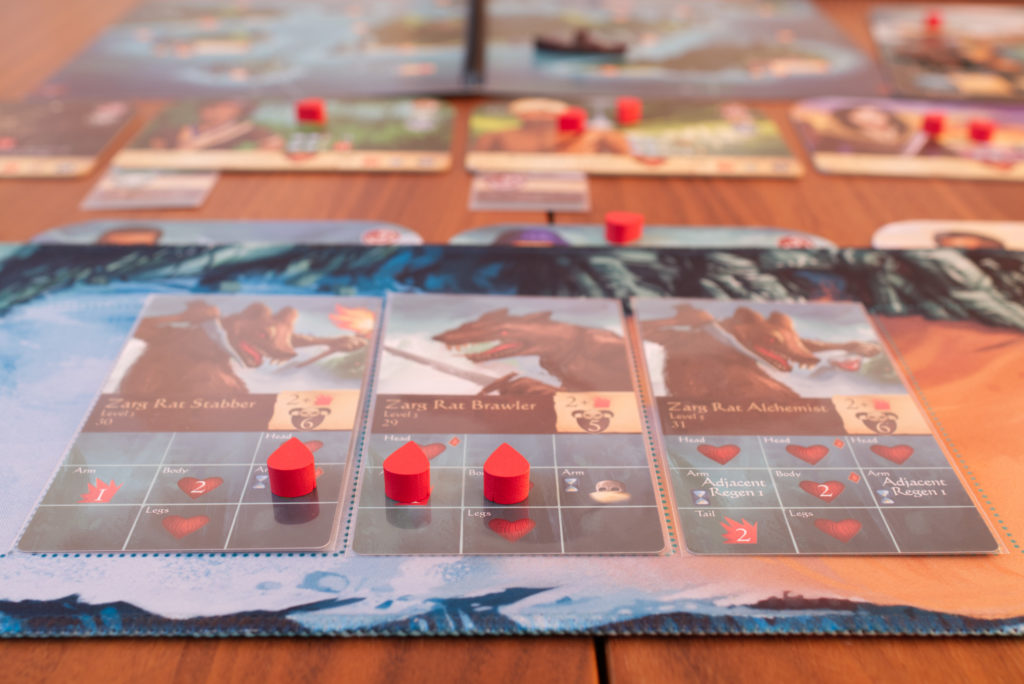
In preparation for this talk, I noticed something interesting in the way difficulty is treated for the skill checks and for combat. In skill checks, it reminded me of some of your older games where if you fail, you are punished, but you are still going your way. You still climb the cliff but you are just hurt. With combat, it’s always “oh you run into three gargoyles, a burning goat, a ghost, and whatever” and we are like: can I flee? Checking rules [Alex makes a browsing-through-book gesture], [both saying at the same time] no, you cannot flee, sorry! [both laugh]
Ryan: It is so brutal!
Was that intentional?
Ryan: So … yes. In Sleeping Gods: Distant Skies, you can run from 80% of the combat. Now the reason I didn’t do that in Sleeping Gods is because I thought “okay, this is gonna mess up the game narratively if I let people run away”. For example, if you are going through a story and you talk to a character, maybe it’s a villain, and you start combat with that villain and you run away, how do I deal with that. Like do I let the players go back? You know, that doesn’t make sense. The villain says the same thing over again. I didn’t know quite how to deal with that.
I was just imagining being in the middle of a fight saying, “sorry, I have to go to the next harbour and cook my soup so I’m back up to full strength. I’ll come back when I’m ready, okay?”. Just doesn’t work.
Ryan: Yeah it didn’t make sense. That’s basically why I didn’t let players run away. And the other things is I thought “okay, we let players fail and they die, but they can still keep playing”. We kind of fixed it in Distant Skies. From the beginning, I would design things and think okay, if there is a combat here and you run away, can you come back or not?
We added a system where you cross off numbers on the map in Distant Skies. If you cross off a number, you can’t go back to it. This allows us to [do things] like if there’s an important story moment and you run away from a boss or villain, you cross off that location. You ran away, you failed the quest, it’s over. Narratively it makes sense. Now let’s say maybe a character asks you for help. So they join you, you have their adventure card. You go and [fight] something they asked you to help with, but you ran away, you lose the card. It’s build in narratively so it makes sense. But there are some encounters where it’s just a monster in the forest and if you run away, you can come back and it will still be there and you can fight it.
I was sort of thinking of how that kind of works in a lot of video games. Especially how it works in Souls games: Dark Souls, Demon Souls. You run into a big monster and it’s way too hard. So you run away from it and you know it’s there. There is a really tough thing, down the hill, behind that mountain. We are not ready for it. We’ll can come back when we are ready or we just know to avoid it from now on.
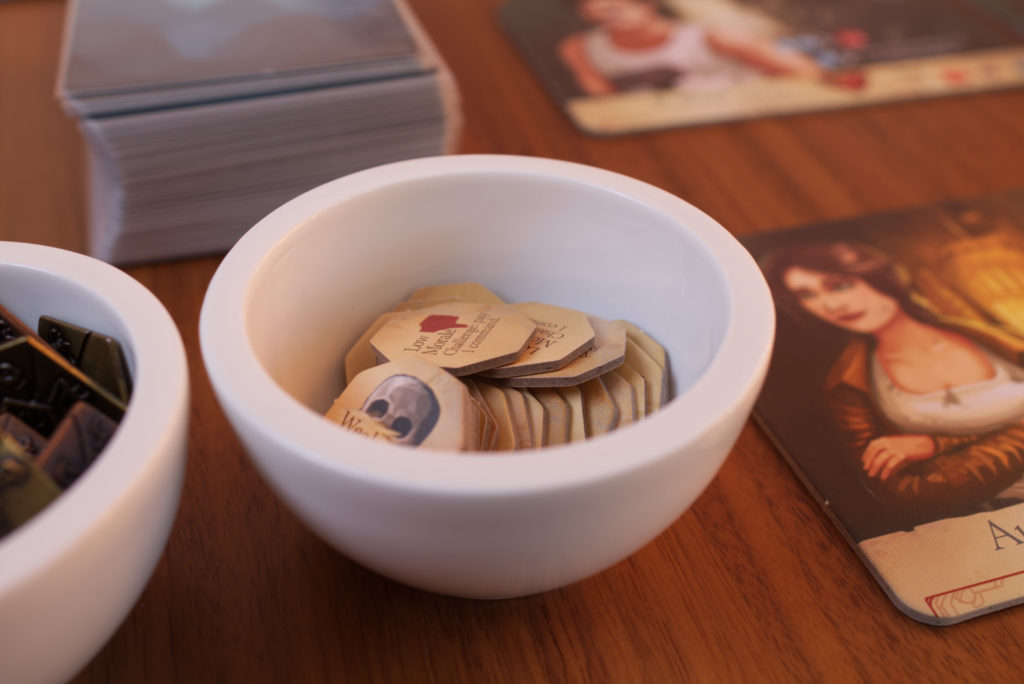
Really excited to try that out in the new game! In Sleeping Gods, losing a battle – unless you are playing in hard mode – just means you are losing time. So I wanted to talk to you about the concept of time in an open-world game.
We have three event decks, so time is ticking, but why is it so important to have time? For me as a player, on some level I didn’t want the game to end. I wanted to play on and on and on so I thought “hey, why is this deck here?”. On the other hand, I once had this quest that was quite epic and I thought when I finish this quest surely the game must be over, and it wasn’t. So I was like “did I do something wrong”? Now I have to wait for time to run out for the game to end?
So two questions: what’s the importance of having time at all and is the third event deck running out more of a catch-all or is it the normal ending?
Ryan: That’s the standard ending if the event deck runs out. There are a few endings, like you mentioned, where the game actually ends early. But most of the endings are just that standard ending, the deck runs out.
Early in the design, the whole game was split into sessions. So a session was kind of like you had to get a certain amount of victory points, [the game] would be over and then you would play another session. That’s basically how a lot of campaign games work. There is a scenario, you finish the scenario.
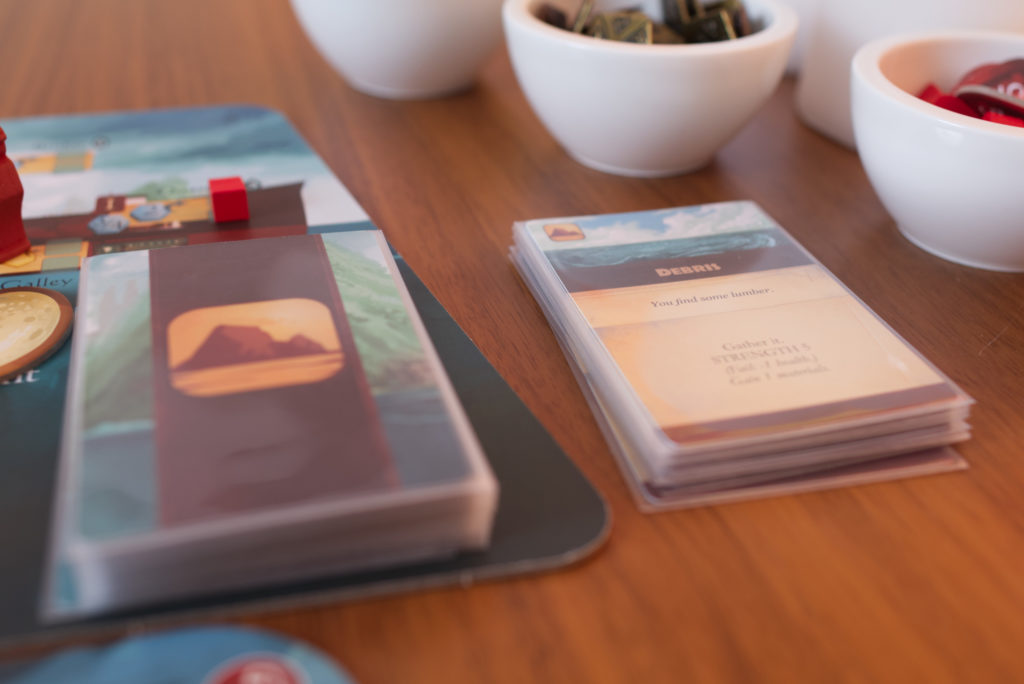
For a while we didn’t have a timer. You could say all the open-world video games, they don’t have a timer. There [are like two] games that has a timer: the original Fall Out and Zelda Majora’s Mask. Those are the only games that have a timer because people usually they hate timers in video games.
So why did we put in a timer? Well, in a video game, if players want to spent hours and hours levelling up, grinding, doing repetitive boring tasks, they can. But in a board game, it really kind of kills the game. I really didn’t want players to do that stuff over and over again. If the game just lets you heal yourself by repeating an action over and over again, there is nothing to really stop you from doing that.
The thing that might stop you from doing that in video games is it’s boring and it takes time. In a board game, you can just flip those cards as fast as you want, you know, and sort of rush over a bunch of turns and get as many resources as you wanted. I feel like that doesn’t really work in a board game. I feel you definitely need a timer, because having a timer makes it so that every action feels important, every choice you make feels way more impactful to your journey because you know there is a clock ticking. Everything is way more important when you have the clock.
We did change how it worked in Distant Skies though. In Sleeping Gods, every turn you draw an event card and once you have gone through the deck three times the game is over. But in Distant Skies, you have a limited number of camps. When you camp, it refreshes your adventure cards, it gives you a little healing, and it refreshes the crew members. And that gives players a little bit more flexibility in exploration.
There is still an event deck but it’s not the timer. You can go through that deck as many times as you want. It sort of motivates players to stretch out their resources as far as they can and it’s kind of an interesting decision. “Oh, should we explore that one more place? We are kind of weak, should we try it or use up a camp?”. That’s a decision you are making a lot of the time in Distant Skies. But that’s still a timer, because I still think it’s really important to have that in a game like this.
Player Motivation
Maybe this is a meta question: what do you think is the goal of Sleeping Gods? Is it to get the crew home or is it something completely different?
Ryan: I think it is different for every player. For most players it’s to get the crew home. But I think as you learn more about the world, you sort of realise getting the crew home has some consequences narratively.
I like that players get to decide what kind of people they are gonna be. Are they gonna be selfish, are they gonna help people around them? And when I say selfish, it doesn’t mean they have to be thieves or super greedy. Sometimes just surviving means they have to make choices that hurt other people. So I think the goal of Sleeping Gods is to experience … it’s really just experience an adventure, that is absolutely the goal. But it’s also to feel like you are making tough character choices sometimes.
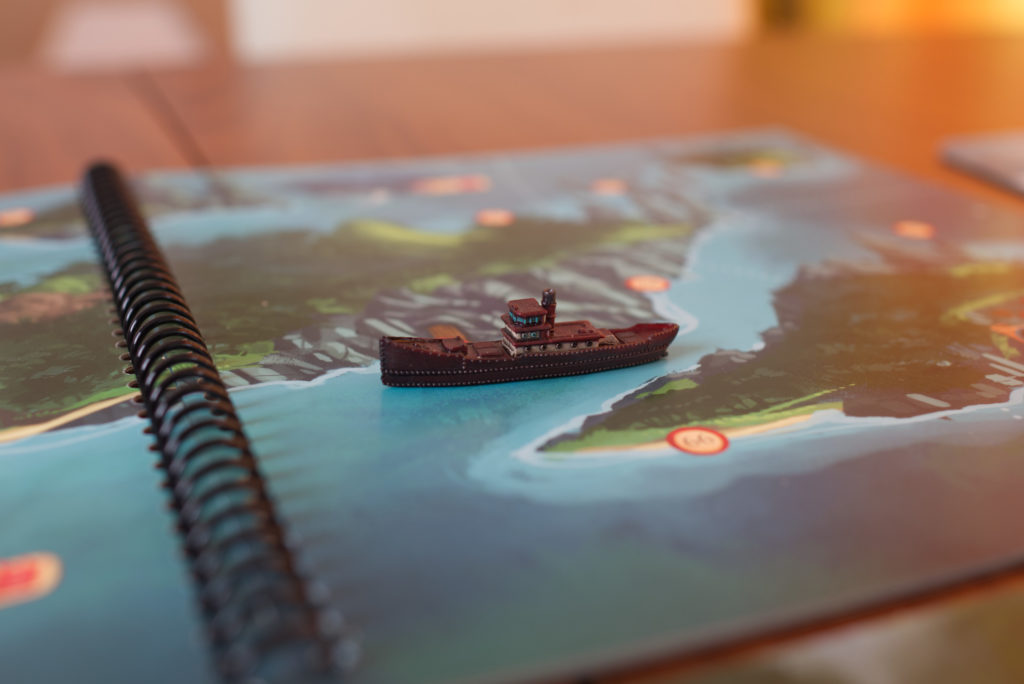
I played John Company: Second Edition lately which is all about cut throat economics, politics, negotiation, and what I found really interesting is that Cole Wehrle put in a leaflet that said “If you approach this game like learning a role playing game, you will have a better time”. My words, not his.
I was thinking if the same isn’t true for Sleeping Gods. If you don’t think “how do I make some nice number of totems?” but rather think “what’s my motivation? do I want to be selfish or not?”, doesn’t that increase the replay value?
I was asking myself what I wanted to do in the next campaign and it’s funny that you mention selfishness because I thought “hey, perhaps I should try to be as selfish as possible, to get home as quickly as possible”. Did you think about giving players some guidance in that sense, like draw this card: this game try to be selfish this game?
Ryan: I don’t think I did in that way, but thinking about the rule book, there is a moment in the rule book, I think in the defeat section, where I say something like “if you are defeated, or if you don’t make it home, it’s okay”. That’s not really the point of the game, that’s not really winning this game. Yes, you should approach it more like a role playing game.
I remember playing it with some play-testers and – this was before the game came out – they really bounced off the design, like, they did not like it [at all]. They were having a horrible time and I was thinking “oh my gosh, this is…”. I was starting to worry about the design and one of the players said “this is a role playing game, isn’t it?”, almost like insulting it [smiles, both laugh].
What a strange insult!
Ryan: Yeah, almost like they were saying it like “oh, this is one of those role playing games”. I think what they had in mind was they were hoping to play a euro game, like a heavy, fair, balanced, euro game.
I remember packing it up, and feeling kind of worried about the game because at this point I had already announced it. People were already excited about it and I was thinking “oh, are there a lot of board games that will have a tough time with this?”. And then I set it up for some other players later that night and they were having an absolute amazing time playing the game.
Yes, you are right, they were treating it like a role playing game and I think that made a huge difference. So I probably should say that at the beginning of the game. You will enjoy this more if you… like Cole says in his game.
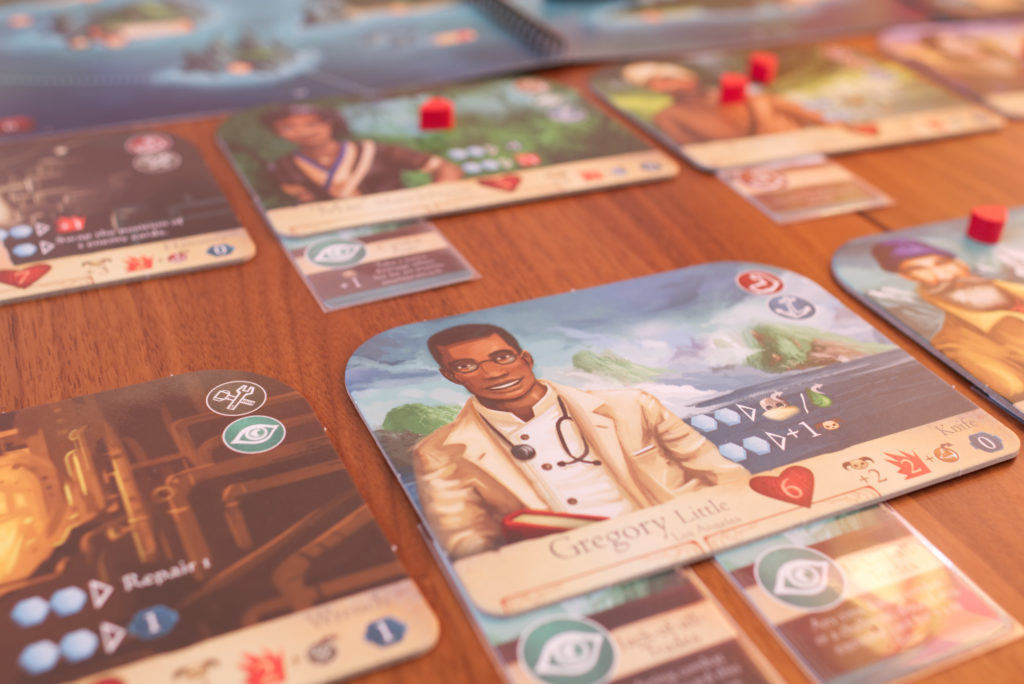
There is a YouTube video where you are being interviewed on some Con, it seemed to be way before the game came out. The interviewer asked you like “hey, you are working on this new game, what is it about?” and you explain “you have this crew, you have this boat, you can go anywhere” and the interviewer was actually stopping, thinking,… you could read in her face “well this doesn’t sound exciting, what should I be asking?”. I found it so funny with hindsight. It’s now a game in the top 100 on BGG, a lot of people love the game, and it was so difficult for her to grasp why this game can be so exciting.
Ryan: Yeah, I remember before we released the game, I was so worried that a lot of board gamers would gonna really not like it. I was pretty down at one point, “this is horrible, I think I should shelf it”. Even after we had worked on it for so long. But then I played it with a few people and just seeing the different reactions… I would see people loving it and other people would hate it. [Both laugh hard]
Public Reception
Seems like there are a lot of people that love it! Lets talk about how it was when it landed in the hands of the players. What was the reception like?
Ryan: It was stressful. I think every game we release, whenever it is released, it gets stressful. You get a lot of opinions right off the bat. Sometimes somebody can say something really loud and you think that’s the final judgement for the game. But there were a lot of people that really loved it and I saw some early reviews where people were really excited about it.
But this is weird. [Ryan smiles] Right when backers got it, mostly it felt like what we were getting was anger and negativity.
Why?!?
Yeah. I don’t know. Oh, I do remember we had shipping struggles, so backers were not getting it all at the same time. This was a horrible, this was right during Brexit, so it was a horrible time for shipping.
So that was an issue. But, there were a lot of players just not liking it. I had to write a guide really early, that was a strategy guide. Because there were tons of people playing it and dying, like a lot! [Alex laughs, Ryan joins in]
And so I wrote up a document and posted it, saying, “okay, if you’re dying a lot” [Alex can’t help laughing] “you gotta be doing these things”. I think that helped a lot. It took a while for some of the big reviews to come out and it started to become apparent that people were actually liking it.
Then it sold out really fast and for a few years we had a hard time meeting demand, because we are so little. When we do a print run, we can’t do a gigantic print run because we just don’t have the resources. And it’s always hard to tell. Just to be frank, a lot of our games we print and publish, sometimes it takes three, four or more years to sell out of that first print run. And so printing too much can really hurt if we are not careful. I can remember there were a couple moments in our history where I printed too much and it put us in danger of running out of money [laughs].
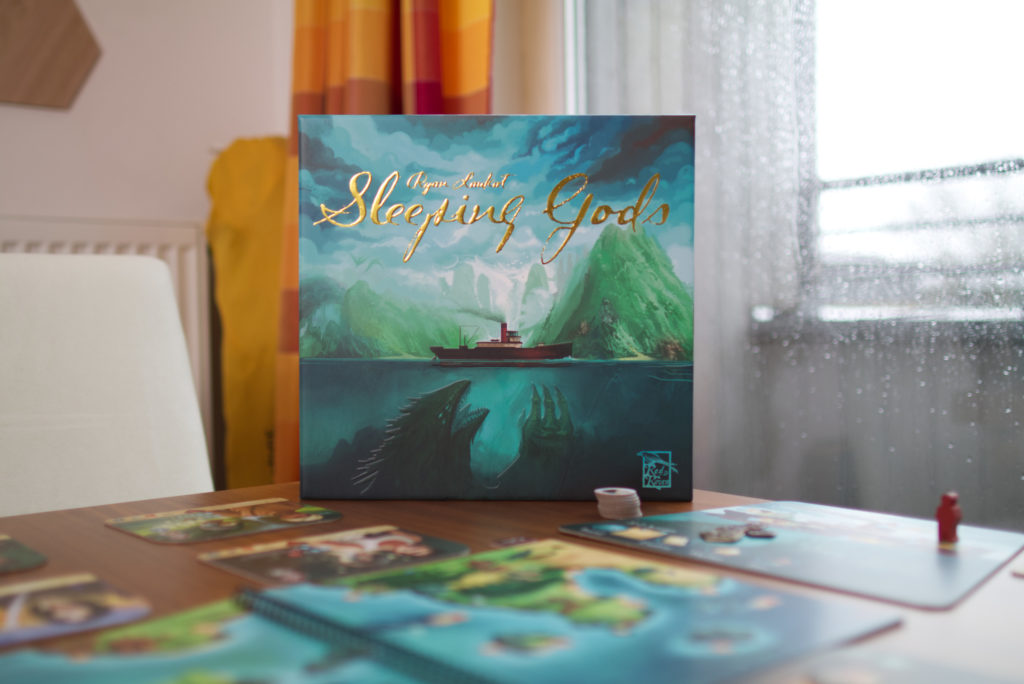
When talking to other authors that I met over the years, I noticed that players often have an incorrect perception of how big print runs are and how much investment they take. But I guess like as you said, even fulfilling demand in time before people move on to the next game is challenging.
Ryan: Yeah, that’s the scary thing. The community can be very loud when they want something but you never know when they are ready to move on to the next thing. So it is always a little scary to devote too much to something.
So what role does Sleeping Gods play for Red Raven Games. Obviously you are doing a second part, so it seems to do well, but is it like “it did well” or is it like “this enables us to do more stuff that we would never have done before”?
I think it changed the direction of our company actually, because it is our biggest selling game, which is weird because it is our most expensive game, too. I would constantly get feedback from distribution and game sellers that our games were too expensive, they would sell better if they were a lower price, and that makes sense.
But the one that costs the most is the one that sells way more than anything else. I guess you could say it’s made it so we can spend a little more time on bigger projects, we are a little bit more secure than we were before where it only would take one flop of a game to bankrupt the company. But we are still so small.
I heard Brenna say that people seem to talk about Red Raven Games a lot but we are actually very small. Like it seems for how big we are like our company, we do get a lot of attention even though we actually don’t sell that many games compared to a lot of other publishers, like small publishers.
Yeah, I totally see that. For me it’s almost like Red Raven Games have their own tag at boardgamegeek. If you go to a game store, there are all the “normal” games and there is the area where the Red Raven games are. It’s one of the most fascinating things in games happening.
The Future
I’m thinking of you as a cook: you are trying to change the ingredients with every game, how much game do you put in there, how much story do you put in there. How do you find a good measure how many mechanisms to put in a game. I could imagine if Sleeping Gods would be just the atlas and a nice story book, some people would perhaps enjoy it more, than having to care about getting rid of fatigue or battling something they cannot beat. What’s the right amount of game mechanism in telling a story?
Ryan: That’s a good question. I think with Sleeping Gods my goal was to lean a little bit more towards simulation because I wanted it to be as immersive as possible. So my thought was this game is gonna ask a little more of you than other games might. I feel having a few more details about your journey sort of helps you immerse in the setting, in the place.
I fell like sometimes simpler games with simpler mechanics are nice because it’s so much easier to get into. The barrier is so much lower so you can usually get more people to play. But you can kind of see the mechanics just on the surface, at least for me. When I can see [them], I’m thinking maybe more about the mechanics because they are so much on the surface rather than …
I don’t know, there is a give and take. That’s a good question. I’m always changing. I feel like I need to dial it back a little more [both laugh] because the last couple of games have been on the heavier side mechanically. But at the same time, I have been playing Robin Hood recently and that’s a really great, amazing, immersive narrative game, and it’s very simple mechanically. And I feel like a lot gets done there with few rules. So, I think it really depends on how much you are trying to create a simulation feel.
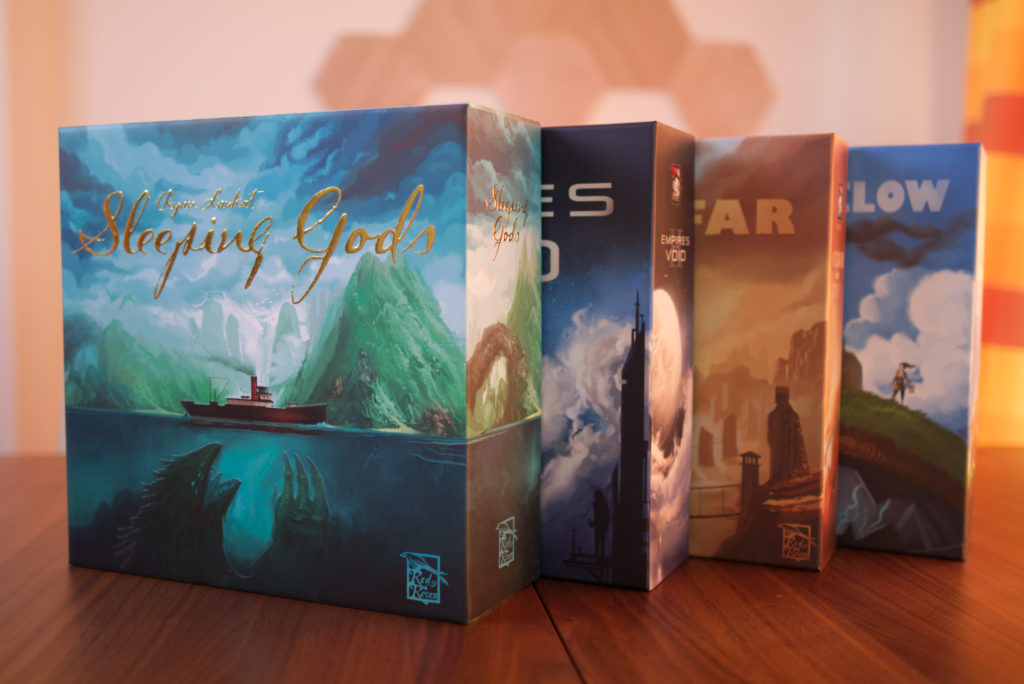
Personally, I’m really excited about getting Distant Skies in my hands and trying out the new combat. In Sleeping Gods, I really like the combat, giving different fields names of body parts, the splash damage. I remember the first time I read the rules and thought this sounds like so much fun, and it was. But then I played Now or Never, which is a way simpler mechanism. We were chucking dice and it was so much fun although there is only a small portion of combat system compared to Sleeping Gods.
How would you compare the combat in Sleeping Gods to Distant Skies, and where do you see it going? Hopefully there will be a third part at some point?
Ryan: Yeah, I think so. Now or Never was definitely motivated by being a multiplayer competitive game, that’s a huge deal because it means combat has to be fast, right? You don’t want turns taking a really long time. So that motivated me to simplify it. But you’re right, at the same time, it probably gets done a lot of what Sleeping Gods does. I do imagine the third … there probably will be a third game, when I have recovered enough [both laugh hard], somewhere down the road.
I imagine like the combat would be on the simpler side. But I do think you can get away with a bit more complexity when it’s a coop game like that. Especially because it’s okay if just one person knows the rules like really well and the other players are learning or don’t know it that well. It’s okay because you can coach the other players. I would say [to one of my game demo-ers] “Seeping Gods is so complex, can we demo this?” and he would say “oh my gosh, it’s the easiest game to demo!”. Because compared to Now or Never, we didn’t even demo that at the last convention because explaining the rules takes so long, setting up the game is so much work. But Sleeping Gods you don’t even have to explain the rules before you start playing. You have to explain very basic things and then you can start playing. As things come up, you can explain them. So I think in that way, it’s a big difference.
To wrap this up a bit. What’s your favourite small detail in Sleeping Gods?
Ryan: Let me think … Okay, I really like some of the weird, hidden endings. There is one I can think of that ends the game early, I don’t think a lot of people find it. I really like that stuff. And some of the weird hidden stories. Like if you get the diving suit and you go to certain places. It’s really hard to find the places that work with the diving suit. There are some stories that I really like that you can only get if you have the diving suit. So kind of the weird, hidden stuff.
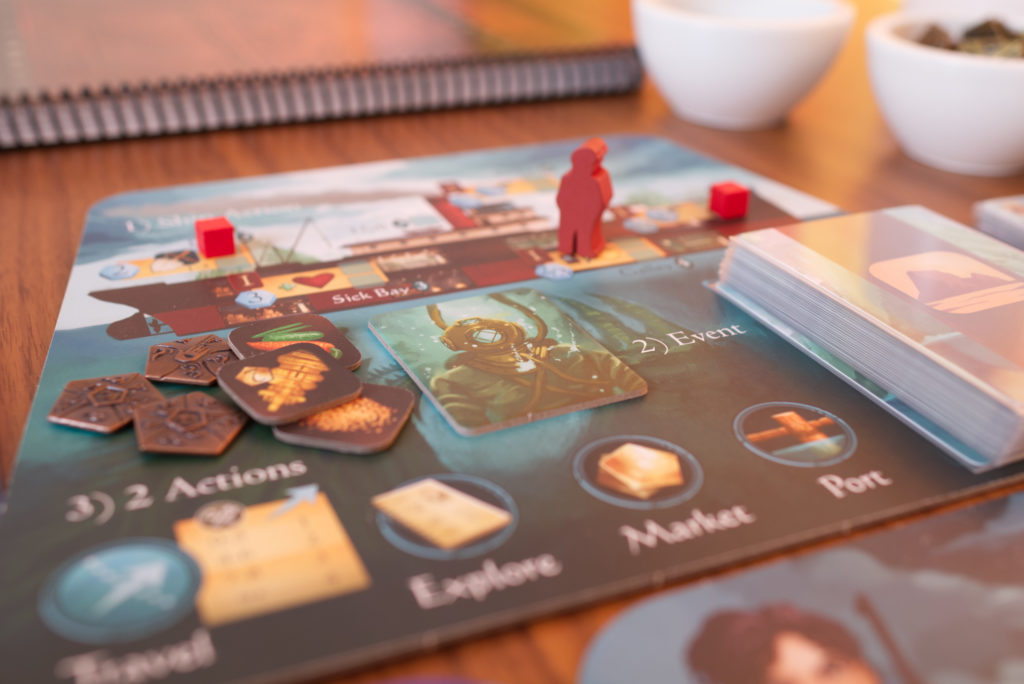
Give players a tip: what should they try which they have not tried already?
Ryan: That’s a though one! I think some of the best stories are hidden on the corners of the world. Maybe when you start playing, if you feel like you’ve gotten some strength, you’ve gotten some weapons, it can be really rewarding to head off into a far off direction and find some quests that are out there. There is a secret, hidden … if you have the expansion, you can go to the underworld. There are some fun things, but they are kind of out of reach. That’s what I would say, get some strength and get prepared, and then venture out far away.
Maybe let’s finish off by you giving your thoughts on where you see the genre going. You have done Sleeping Gods, you have just finished off Distant Skies. How would describe Distant Skies to players that have played Sleeping Gods and where do you think will the next part lead you?
Ryan: Distant Skies is in some ways bigger than Sleeping Gods 1. It isn’t a lot bigger, but… Distant Skies doesn’t have an expansion, so with Tides of Ruin, Sleeping Gods is bigger. But in Distant Skies, I feel like we tried to do it more with characters. You learn more about the characters’ backstories. The characters are just more present, even the gods are a lot more present. Our goal in Distant Skies was to bring out the characters more than in Sleeping Gods. We also try to give players more agency, so we have some new mechanics. There are the wandering encounters where it is a picture of a location and everybody gets to choose where the characters go separately, which is something I like.
I think for us, I wanna explore the open-world idea more. But I feel like there are ways where we can try it without the story book or with a much smaller story book. Or, I feel like there are different ways how we can approach it. To be frank, to write these giant story books is super taxing and sometimes I think there might be another style that is similar to this but is more like an exploration puzzle game if that makes sense. More like a Zelda game.
But I also feel like in general, what other people are doing, I see a ton of these types of games coming out this year and moving forward it’s gonna be a lot more common. I’m sort of waiting for somebody to create something that is like really, really character focused. I haven’t seen a ton of that kind of stuff. I would love to see something that is not fantasy. Something that is maybe in like 19…, it’s a noir story in Chicago or something like that, where it’s an open-world game that’s really focused on character choices and uses a quest card system. I think there is so much you can do that people haven’t done yet.
I guess it would make it even more difficult for an author or publisher to find the right audience. I remember talking to someone ages ago, and they said “if you want a game to succeed, just put it in the middle ages, do something city building, and it works. If you start going to space, you lose people. If you go to unusual setting, you lose people.
Ryan: Yeah. So what I want to do personally … I’ll just share this: I really, really want to do a Sleeping Gods set in space. I would love to do that. Oh, Malorie and I are always talking about this. I know that I would lose a large part of the audience if I did because Empires of the Void 2, it didn’t do well. It did fine, I shouldn’t say that, it did fine but now I’m scared of space. I love Sci-Fi, I would love to do that! But I’m a little … I’m just nervous. You definitely lose some audience when you do that.
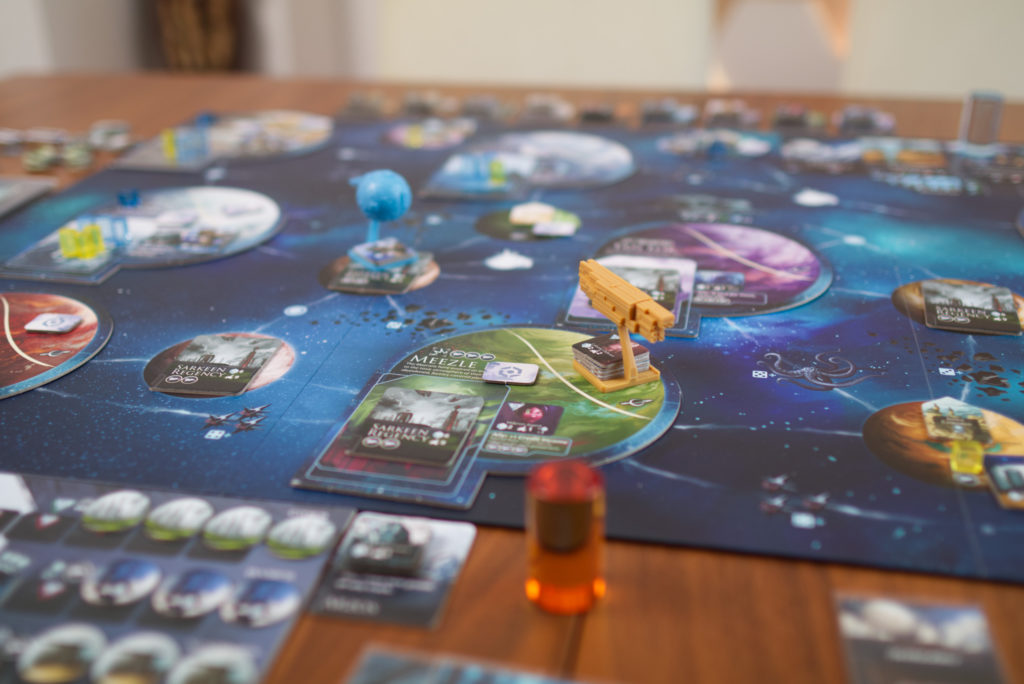
Well, I would say, let’s wrap it up for Sleeping Gods. Thank you for all the information, congrats on a great game. I think it has deserved the pinnacle role it has achieved.
Ryan: Oh, thank you so much.
When I hear all the struggles you had … I was thinking if in the beginning I should make you a compliment for being able to achieve this game without neither ruining your health or your company. It seems to be like an impossibility almost.
Ryan: Right, [Ryan laughs] it did feel like that many moments.
It’s an amazing game, so congrats.
Ryan: Thank you!
If you enjoyed reading this, please leave feedback in the comments. Doing in-depth interviews takes a lot of prep & research and it’s really rewarding to see that so many of you seem to enjoy reading them. Showing your support helps getting future interview partners on board! You can find more interviews like in the interview section.
(Disclaimer: This is an edited version of a 2-hour conversation. I’ve tried to keep it as close to the original as possible and did minor corrections/omissions where they were needed for better readability. I had to cut out some tangents we went on though, otherwise this would have been even longer. Many thanks again to Ryan Laukat for taking so much time out of his very busy schedule and allowing all of us an in-depth look into Sleeping Gods.)

Some folks might like the tangents y’all go on so maybe a non-edited down version?
Maybe some day. I don’t think it would work in text form but might as a podcast episode. But I want to get a couple more interviews in before I decide on whether or not I want to release any of the conversations in audio form. It’s a lot off work to edit a podcast, so I don’t want to commit to it before I know the interview series will continue and produce lots of episodes.
Great interview, really enjoyed reading it!
Thanks. Feedback like this makes it worth it putting in all those hours!
Loved the article, thanks for your work! And thanks to Ryan for the amazing game 😉 ! My 10 year old daughter & I had a blast on our first campaign, we just started a second one and recruited my wife too this time.